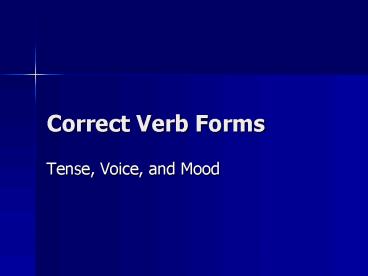Correct Verb Forms - PowerPoint PPT Presentation
1 / 13
Title: Correct Verb Forms
1
Correct Verb Forms
- Tense, Voice, and Mood
2
Verb Tense
- Verb tenses explain time relationships.
- There are Simple Verb Tenses
- Past We were here last week.
- Present No one lives there.
- Future The exit essay will be later.
3
Tenses Can Tell More Than Just the Time
- Present tense verbs can express
- Habitual action Nerds study a lot.
- General truth Summers get hot.
- Future events The train leaves at 9.
- Dramatic action The Fonz acts cool.
4
The Perfect Tenses
- The present perfect expresses what began and
still counts. - Walmart has been in business for years.
- The past perfect tells what happened before
another past event. - She had dated him before they married.
- The future perfect indicates actions that will
begin at a specific time. - By the time you graduate, you will have written
a lot of essays.
5
Tenses Follow Sequence
- The simple past can mean two actions happened
before at the same time. - When Bill spoke, everyone listened.
- Switching between past and present mixes up the
time sequence. - I saw the thriller, and I get scared.
6
Infinitives and Gerunds
- Infinitive verbs show purpose.
- Shane went out to relieve his boredom.
- Gerund verbs express nominal action.
- Bringing home fast food helps my mom.
7
Participial Verbs
- Present participles express action co-occurring
with the main verb. - Falling asleep, Ed dozed on the sofa.
- Past participles form the passive.
- Fallen from above, Lucifer turned Satan
- Present perfect participials tell of an event
before the main verb. - Having eaten, Bart wanted no pizza.
8
Verbs Have Voices, Too.
- Voice shows the connection between the action of
the verb and its subject. - Active voice stresses the doer.
- The friends hang out to drink on Fridays.
- Passive voice emphasizes the receiver.
- The friends are hung over on Saturdays.
9
Verbs Also Have Moods.
- The writers attitude is called mood.
- Plain statements are in indicative mood.
- There are twenty students in the class.
- Requests reflect the imperative mood.
- Stop worrying and end the anxiety.
- Conditionals are in subjunctive mood.
- I would like to go tubing this weekend.
10
The Conditional Mood
- The conditional or subjunctive mood expresses a
tentative attitude. - The conditional past of be is were.
- If I were you, Id check it for errors.
- The conditional present lacks the s.
- We asked that the hotel give us a room.
11
Common Subjunctives
- Subjunctives occur after verbs like demand,
request, and suggest. - Students ask that parking be expanded.
- Would is a common alternative.
- Commuters would like more parking.
- But would is not real.
- I would study more if I had more time.
12
Sit/Set, Lie/Lay, and Rise/Raise
- We can set, lay, and raise things.
- Lets set the table for dinner.
- The money lay on the end table.
- If you have a question, raise your hand.
- But we ourselves sit, lie, and rise.
- We sit on soft chairs in the lab.
- Its bad if I lie on a bed thats too soft.
- Then its hard to rise in the morning.
13
Verbs Create Sense
- The verb is the sentence core, so wrong verb
forms create nonsense. - Gone with the Wind was a movie that shows the
Southern culture of the past. The show would be
from around the Civil War. If you would have
seed it, then you can know its true mood.































